2018 SkS Weekly Climate Change & Global Warming Digest #17
Posted on 29 April 2018 by John Hartz
Story of the Week... Toon of the Week... Quote of the Week... Graphic of the Week... SkS in the News... Photo of the Week... SkS Spotlights... Video of the Week... Coming Soon on SkS... Poster of the Week... Climate Feedback Reviews... SkS Week in Review... 97 Hours of Consensus...
Story of the Week...
Gulf Stream slowing down is bad news for Ireland
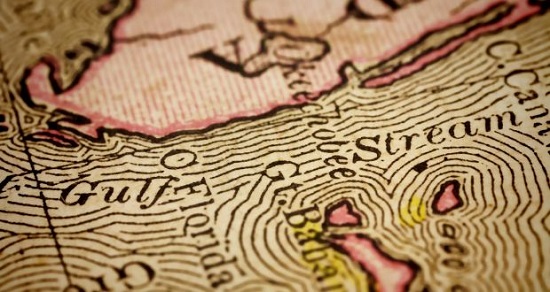
Ireland lies relatively far north in the Atlantic so the Gulf Stream’s gift of more temperate waters matters hugely to our climate.
All Ireland is washed by the Gulf Stream,” said Stephen Dedalus in the opening chapter of Ulysses. He might have added warmed to washed.
Ireland lies relatively far north in the Atlantic so the Gulf Stream’s gift of more temperate waters matters hugely to our climate, as does their interaction with the atmosphere to produce the sea surface temperature. This oceanic movement of waters is known scientifically as the Atlantic Meridional Overturning Circulation (Amoc). It brings warm and salty water from the Caribbean region in a northeasterly current towards the Nordic Seas.
As Summer K Praetorius goes on to explain in the April 11th issue of the scientific journal Nature: “In the chill of winter, these waters cool and descend with the heavy load of their salinity. This deep convection is a key part of the Amoc which can be thought of as an ocean conveyor belt that releases heat to the atmosphere above the North Atlantic Ocean before travelling through the abyssal ocean to resurface in other areas of the world.” The process is linked to and replicated throughout the world’s oceans by the deep colder waters that travel past North and South America.
Gulf Stream slowing down is bad news for Ireland by Paul Gillespie, Irish Times, Apr 28, 2018
Note: Also see Graphic of the Week section of this Digest.
Toon of the Week...
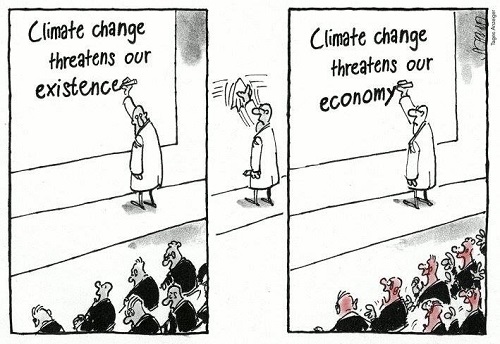
Quote of the Week...
But the problem with the way geoengineering is discussed today, lamented John Ehrenfeld, former director of the MIT Program on Technology, Business, and Environment, is that it doesn’t address the societal issues that got us in this mess in the first place.
“It’s a failure to accept complexity of the system, and the system includes people,” Ehrenfeld told me recently over coffee. For decades, Ehrenfeld, who is now retired, researched and promoted the concept of sustainability. But to Ehrenfeld, after all the climate conferences, all the stakeholder roundtables, all the debates on market-driven solutions, the questions and answers being debated never questioned capitalism, civilization, and the notion of progress.
Tackling a problem as deeply ingrained as global warming, Ehrenfeld said, will require humanity to face an existential question that geoengineering alone cannot address: Are we willing to sacrifice growth to ensure the survival of our species?
“Absent decoupling growth from progress,” Ehrenfeld said, “we won’t address the core of the problem.”
The Dangerous Belief That Extreme Technology Will Fix Climate Change by Aleszu Bajak, Huff Post, Apr 27, 2018
Graphic of the Week...
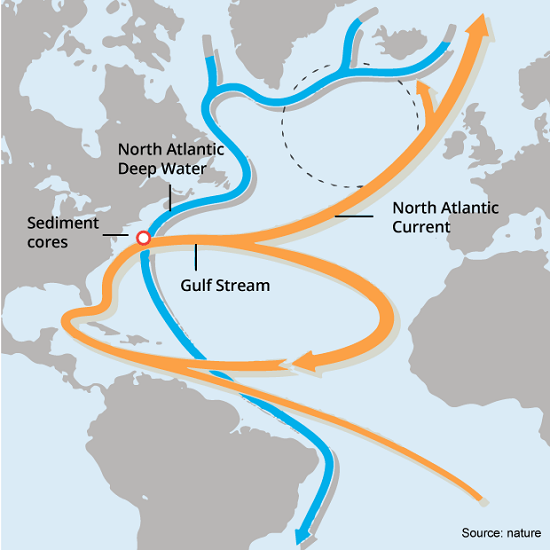
Gulf Stream slowing down is bad news for Ireland by Paul Gillespie, Irish Times, Apr 28, 2018
SkS in the News...
The SkS Escalator graphic is embedded and extensively referenced in in Matt Rogers' Washington Post article, Global temperatures have dropped since 2016. Here’s why that’s normal.
Photo of the Week...
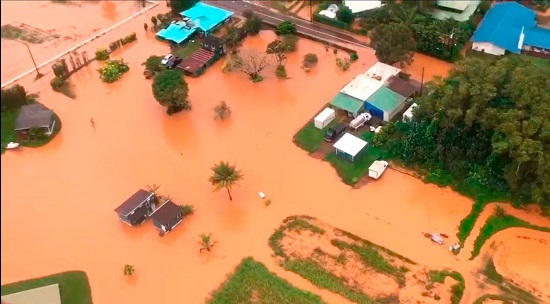
Floodwaters on the Hawaiian island of Kauai turned orange, a sign of the high iron content in the volcanic soil. (Brandon Verdura / Associated Press)
A Hawaiian island got about 50 inches of rain in 24 hours. Scientists warn it's a sign of the future by Heidi Chang, Los Angeles Times, Apr 28, 2018
SkS Spotlights...

The Carbon Pricing Leadership Coalition (CPLC) brings together leaders from government, private sector, academia, and civil society to expand the use of carbon pricing policies.
Video of the Week
97% of Climate Scientists Really Do Agree, It's OK To Be Smart, PBS/YouTube, Apr 19, 2018
Coming Soon on SkS...
- Republicans have so corrupted EPA, Americans can only fix it in the voting booth (Dana)
- TV Meteorologists Warming to Climate Science (greenman)
- Guest Post (John Abraham)
- SkS Analogy 11 - Frame of Reference (Evan Whitby)
- New research this week (Ari)
- 2018 SkS Weekly Climate Change & Global Warming News Roundup #18 (John Hartz)
- 2018 SkS Weekly Climate Change & Global Warming Digest #18 (John Hartz)
Poster of the Week...

Climate Feedback Reviews...
The Australian’s coverage of Great Barrier Reef study creates perception that scientists are divided
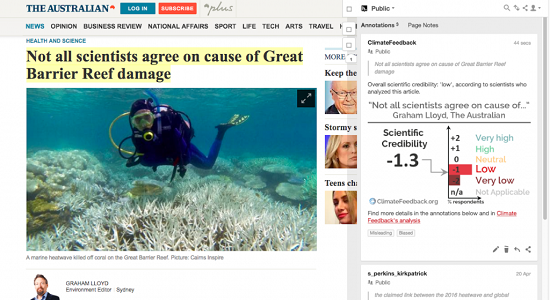
Climate Feedback asked its network of scientists to review the article, Not all scientists agree on cause of Great Barrier Reef damage by Graham Lloyd, Health & Science, The Australian, April 19, 2018
Four scientists analyzed the article and estimate its overall scientific credibility to be 'low'.
A majority of reviewers tagged the article as: Biased Misleading.
Review Summary
This article in The Australian covers a new study published in Nature that concludes global warming played a key role in the recent large-scale bleaching and mortality of corals in the Great Barrier Reef. Based on the comments of a single oceanographer (Prof. Kaempf), the article was headlined “Not all scientists agree on cause of Great Barrier Reef damage”.
The scientists who reviewed this article found that this source’s comments in the story are unsupported by evidence and prior research, and therefore The Australian article misleads readers by emphasizing a “debate” that does not actually exist among researchers studying the Great Barrier Reef.
The Australian’s coverage of Great Barrier Reef study creates perception that scientists are divided by Scott Johnson, Climate Feedback, Apr 22, 2018
SkS Week in Review...
- 2018 SkS Weekly Climate Change & Global Warming News Roundup #17 by John Hartz
- New research, April 16-22, 2018 by Ari Jokimäki
- The missing maths: the human cost of fossil fuels by Ploy Achakulwisut (Cimate Consensus - the 97%, Environment, Guardian)
- America's best scientists stood up to the Trump administration by John Abraham (Cimate Consensus - the 97%, Environment, Guardian)
- Climate Science Denial Explained: The Denial Personality by DPiergrass
- Pruitt promised polluters EPA will value their profits over American lives by Dana Nuccitelli (Cimate Consensus - the 97%, Environment, Guardian)
- 2018 SkS Weekly Climate Change & Global Warming Digest #16 by John Hartz
97 Hours of Consensus...
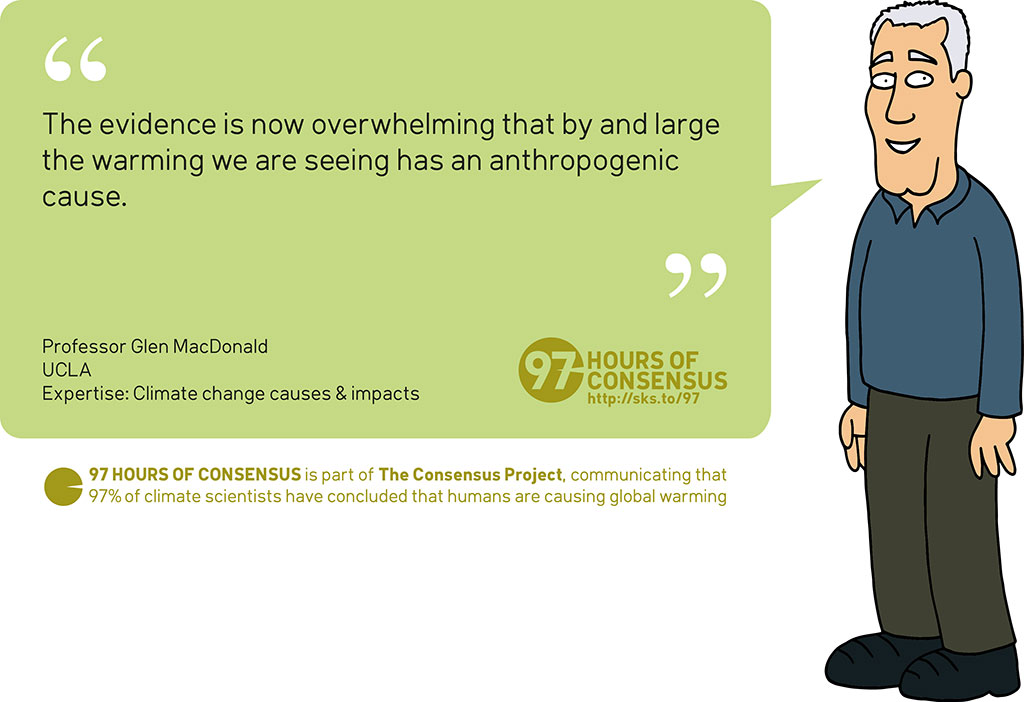































 Arguments
Arguments






























Related article from Scientific American on gulf stream (amoc) slowing : Slow-Motion Ocean: Atlantic’s Circulation Is Weakest in 1,600 Years
And a climate scientist estimates gulf stream could slow enough by 2300 to cause north atlantic winter temperatures to drop 7 degrees. This is huge.
[JH] More articles also listed in the 2018 SkS Weekly Climate Change & Global Warming News Roundup #17
If Amoc is slowing shouldn't this result in something of a recovery in the amount of ice created in the Arctic each winter...... which in turn should result in more deep ocean water produced from the brine.....which should result in the re-strenthening of Amoc. How much of the deep ocean water is created by the sinking of the cooling Gulf Stream and how much by sea water freezing - creating brine. Shouldn't we see the ice extent flick flacking back and forth for a while until we are re-established in a new climate regime.
william - more complicated than that. See here.